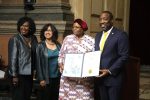While the handover of 52 new houses in Okakarara last week brought tangible relief to dozens of families, the speeches by high-ranking officials revealed a far more ambitious and urgent national mission: a concerted, multi-billion-dollar government offensive to tackle Namibia’s crippling housing shortage, with a laser focus on formalising the country’s sprawling informal settlements.
In a powerful statement during the ceremony, the Minister of Urban and Rural Development, James Sankwasa, framed the housing situation in stark terms, declaring it an “emergency” driven by a national backlog estimated at a staggering 300,000 units. This context transformed the event from a local celebration into a national symbol of a much larger struggle.
The government’s strategy, as outlined by both Minister Sankwasa and Mr. Hastings Tjipueja, Deputy Chairperson of the National Housing Enterprise (NHE) Board, is not merely about building houses but fundamentally reshaping the urban landscape. The core of this plan is the nationwide Informal Settlement Upgrading Programme (ISUP), a bold initiative targeting the construction of 10,000 housing units annually for the next five years.
Minister Sankwasa emphasised that this targeted approach is a deliberate response to the nation’s socio-economic reality. “The bold targets that government has set with regards to housing are specifically addressing the lowest income categories of our people,” the Minister stated. He pointed to recent census data revealing that approximately 29% of Namibian households reside in informal structures, with 40% of those concentrated in urban areas. “This means to address the housing situation; informal settlements should be the starting point,” he affirmed, justifying the channeling of “millions of dollars into this endeavor.”
The NHE, as the government’s primary implementing agency for housing, has adopted what Mr. Tjipueja described as an “aggressive approach” to meet these targets. The scale of its ambition is significant. For the current 2025/26 financial year, which began on 1 July, the Enterprise has already constructed 185 houses. The annual target is a total of 905 project houses, plus an additional 2,000 units under the ISUP, bringing the yearly goal to nearly 3,000 new homes.
The Okakarara project, completed eight months ahead of schedule at a cost of N$12.2 million, serves as a microcosm of the intended model. It demonstrates the potential for speed and efficiency while creating local employment, having engaged 80 local workers. Furthermore, it highlights the critical collaboration between the NHE and local authorities, a partnership repeatedly stressed as non-negotiable for success.
Minister Sankwasa directly addressed a key obstacle to affordability: the cost of land. He challenged the notion that houses built by the government on government land should be unaffordable. “The advantage is that the custodian of land are the local authorities, who are also part of government just like the NHE. There is therefore no reason for anyone to say houses build by government, on government land, are not affordable because the land is expensive,” he argued. This statement signals a firm directive from the central government for local authorities to make land available at minimal cost to enable truly affordable housing.
The response from municipalities, according to Mr. Tjipueja, has been “overwhelming.” He reported that projects have already kickstarted in towns like Swakopmund and Otjiwarongo, indicating early momentum for the national programme. The ISUP model is designed with affordability at its core. Through extensive public education campaigns, the NHE is ensuring that potential beneficiaries understand that monthly repayments for these homes are set at approximately N$400, a figure aimed squarely at low-income earners who are typically excluded from the formal housing market.
However, the ambition of the programme is matched by the immense challenge of implementation. The Minister’s speech carried a tone of impatience, underscoring that “time is of great essence.” He called on all stakeholders, including local authorities, the NHE, and the Shack Dwellers Federation, to deliver on their roles. “We are ready to work with those who are ready to execute and speedily provide housing to our people throughout the 14 regions of our country,” he stated, a clear message that the government expects swift and tangible results.
The NHE’s internal machinery is also being recalibrated for this accelerated pace. Mr. Tjipueja provided an update on the allocation of 362 Mass Housing units in Windhoek and 24 in Opuwo, revealing that following the publication of potential beneficiaries, the NHE team is now deep into the verification and assessment phase. “The intention is to ensure that all houses are occupied by the end of the year, in line with the directive issued by the Government,” he said, assuring the Minister of a “sense of urgency.”
This urgency is rooted in a vision that transcends bricks and mortar. Both speakers eloquently framed housing as a matter of fundamental human dignity. For Minister Sankwasa, it is about providing shelter to those “who are often not catered anywhere in the housing market due to affordability challenges.” Mr. Tjipueja echoed this, describing the new houses as “not just structures of brick and mortar but a representation of security, a foundation upon which families in Okakarara will build their future generations.”
The success of the entire programme hinges on a virtuous cycle of repayment. Mr. Tjipueja’s congratulatory message to the new homeowners in Okakarara included a crucial plea: “adhere to your repayment schedules.” He explained that this would allow the NHE to “reinvest the money and assist more families who are in dire need of decent housing.” This highlights the financial sustainability aspect of the programme, where successful repayments from one project fuel the creation of the next.
As the dust settles on the celebration in Okakarara, the real work continues across Namibia. The government, through the NHE, has laid down a clear and ambitious marker. The war on the housing backlog is being fought on the frontlines of informal settlements, with a strategy focused on affordability, collaboration, and speed. The coming months will be a critical test of whether this aggressive, targeted approach can begin to turn the tide on one of Namibia’s most pressing social challenges. The hope of hundreds of thousands of Namibians living in informal settlements rests on its success.










